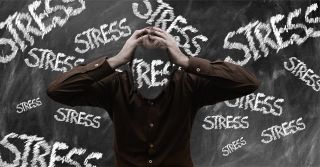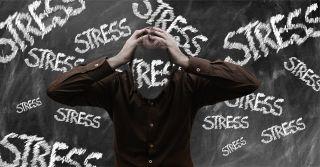KEY POINTS-
- Stress is a topic that has exploded in popularity over the past several decades.
- The stress-reduction industry overemphasizes the avoidance of stressors at the expense of resilience.
- A more balanced approach would focus on resilience and the ability to adapt and cope with stress effectively.

It’s almost impossible to avoid—the constant stream of headlines about the dangers of stress. Everyone is stressed out, stress will kill you, stress is at alarming levels, and, more recently, micro-stress is dangerous.1 The ever-present (and ever-expanding) claims being made over the last several decades have resulted in people and businesses becoming much more hyper-focused on stress.2 To accommodate the need, a stress management industry has developed, introducing various products and services to help reduce stress. It’s a thriving industry, making a killing to the tune of several billion dollars a year.3
One of the chief claims that continues to exist comes from the American Institute of Stress (AIS) claiming that “Job stress is estimated to cost the US industry more than $300 billion in losses due to absenteeism, diminished productivity, and accidents.” The oddity of this claim is that it has been circling for well over a decade (always attributed to AIS), and, yet, no evidence was ever produced to justify the claim. Instead, it appears the number was simply just made up based on hypothetical data and guesses, even though it gets repeated as fact over and over.
To sum this all up, there’s an entire industry set up to reduce stress, a problem that has some unknown cost to society. And, yet, this industry doesn’t seem to be doing a very good job if stress has, as the American Psychological Association claimed in 2022, reached “alarming levels” (a claim I already debunked). In fact, it seems like the more we talk about and invest in stress management, the worse the problem becomes.
Maybe that’s because stress has become, as MacLellan (2018) argued, “a catch-all phrase for anything that’s bad.” And while it would be easy to cast blame onto Hans Selye, the man who originally coined the term stress, such a criticism would be misplaced.4 In fact, Selye (1976) merely defined stress as “the nonspecific response of the body to any demand made upon it.” Selye’s essential argument (though it was mostly focused on the physiology of stress) was this:
- Demands produce physiological arousal (alarm).
- We respond to that arousal (psychologically and behaviorally) by marshaling our resources by either resisting or acting on that demand (resistance).
- We then require time to recover or else, over time, it can lead to exhaustion and other adverse health consequences (recovery/exhaustion).
Nowhere in Selye’s theory did he claim that stress was innately problematic. In fact, he acknowledged that stress was unavoidable, that it was “the spice of life,” and that “complete freedom from stress is death.” And, yet, most stress research and practice has largely been invested in the “stress is bad” mantra.5 This has led, as Wanic (2023) suggests, to an overemphasis on the reduction of demands (i.e., stressors), even little ones like micro-stressors, and an underemphasis on the capability of building up resistance to stressors (i.e., resilience).
And, yet, as Adams (2016) reported, there’s evidence that such resilience building is possible. As I’ve argued elsewhere, too little adversity can lead to reduced resilience and an inability to cope, but too much of it can lead to what Selye referred to as exhaustion. By overemphasizing the avoidance of stressors at the expense of resilience (a clear case in point is the article on micro-stress), the unintended consequence is that everyday life stress is likely to have an even more adverse effect on health (because less intense and prolonged stressors will be enough to create bodily wear and tear).
So, there’s a tension to manage. On the one hand, we need to ensure we have basic resilience to be able to more readily resist or bounce back from various stressors we experience. On the other hand, demands, regardless of how stressful they are, require that we expend resources to address them. But to assume that all stress is bad and that the goal should be to eliminate stress is both unrealistic and counterproductive. As Maurer (2016) argued, what we refer to as stress is generally the fear of not being able to do something. And, typically, that fear results from either (1) a perceived lack of control or (2) a perceived inefficiency of resources.6 It’s how we respond to it that determines its effects on us and our goals.
Now, in fairness to the stress management industry, there is certainly a place for effective stress management products and services.7 After all, no matter what we do, stress isn’t going to go away. As such, various stress management techniques like meditation, mindfulness, exercise, and therapy can be effective. But specific techniques vary in their utility. Some techniques are useful for building resilience, some are useful for managing our emotional reactions to stressors, and some are useful in some situations but not others. This nuance, though, is often ignored by advocates of specific stress management approaches, who often espouse a universal approach to dealing with stress.8
Rather than solely concentrating on reducing stressors, a more balanced approach would be to cultivate resilience and the ability to adapt and cope with stress effectively. By enhancing our resilience, we can build a stronger foundation to navigate the ups and downs of life. But very few of the product and service providers within the stress management industry take such a balanced approach, which is why there is more bluster than benefit within that industry.


